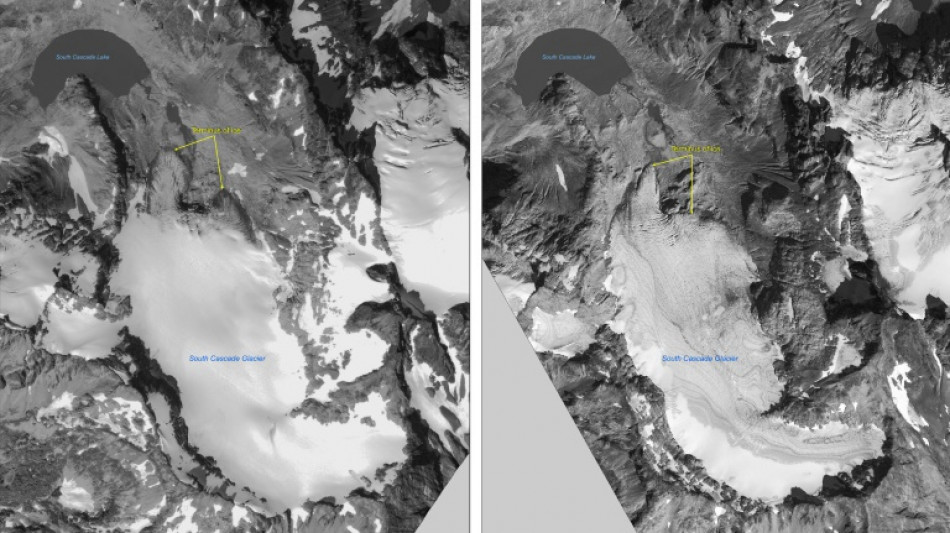
-
 Dollar halts descent, gold keeps climbing before Fed update
Dollar halts descent, gold keeps climbing before Fed update
-
US YouTuber IShowSpeed gains Ghanaian nationality at end of Africa tour

-
 Sweden plans to ban mobile phones in schools
Sweden plans to ban mobile phones in schools
-
Turkey football club faces probe over braids clip backing Syrian Kurds

-
 Deutsche Bank offices searched in money laundering probe
Deutsche Bank offices searched in money laundering probe
-
US embassy angers Danish veterans by removing flags

-
 Netherlands 'insufficiently' protects Caribbean island from climate change: court
Netherlands 'insufficiently' protects Caribbean island from climate change: court
-
Fury confirms April comeback fight against Makhmudov

-
 Susan Sarandon to be honoured at Spain's top film awards
Susan Sarandon to be honoured at Spain's top film awards
-
Trump says 'time running out' as Iran rejects talks amid 'threats'

-
 Spain eyes full service on train tragedy line in 10 days
Spain eyes full service on train tragedy line in 10 days
-
Greenland dispute 'strategic wake-up call for all of Europe,' says Macron

-
 'Intimidation and coercion': Iran pressuring families of killed protesters
'Intimidation and coercion': Iran pressuring families of killed protesters
-
Europe urged to 'step up' on defence as Trump upends ties

-
 Sinner hails 'inspiration' Djokovic ahead of Australian Open blockbuster
Sinner hails 'inspiration' Djokovic ahead of Australian Open blockbuster
-
Dollar rebounds while gold climbs again before Fed update

-
 Aki a doubt for Ireland's Six Nations opener over disciplinary issue
Aki a doubt for Ireland's Six Nations opener over disciplinary issue
-
West Ham sign Fulham winger Traore

-
 Relentless Sinner sets up Australian Open blockbuster with Djokovic
Relentless Sinner sets up Australian Open blockbuster with Djokovic
-
Israel prepares to bury last Gaza hostage

-
 Iran rejects talks with US amid military 'threats'
Iran rejects talks with US amid military 'threats'
-
Heart attack ends iconic French prop Atonio's career

-
 SKorean chip giant SK hynix posts record operating profit for 2025
SKorean chip giant SK hynix posts record operating profit for 2025
-
Greenland's elite dogsled unit patrols desolate, icy Arctic

-
 Dutch tech giant ASML posts bumper profits, cuts jobs
Dutch tech giant ASML posts bumper profits, cuts jobs
-
Musetti rues 'really painful' retirement after schooling Djokovic

-
 Russian volcano puts on display in latest eruption
Russian volcano puts on display in latest eruption
-
Thailand uses contraceptive vaccine to limit wild elephant births

-
 Djokovic gets lucky to join Pegula, Rybakina in Melbourne semi-finals
Djokovic gets lucky to join Pegula, Rybakina in Melbourne semi-finals
-
Trump says to 'de-escalate' Minneapolis, as aide questions agents' 'protocol'

-
 'Extremely lucky' Djokovic into Melbourne semi-finals as Musetti retires
'Extremely lucky' Djokovic into Melbourne semi-finals as Musetti retires
-
'Animals in a zoo': Players back Gauff call for more privacy

-
 Starmer heads to China to defend 'pragmatic' partnership
Starmer heads to China to defend 'pragmatic' partnership
-
Uganda's Quidditch players with global dreams

-
 'Hard to survive': Kyiv's elderly shiver after Russian attacks on power and heat
'Hard to survive': Kyiv's elderly shiver after Russian attacks on power and heat
-
South Korea's ex-first lady jailed for 20 months for taking bribes

-
 Polish migrants return home to a changed country
Polish migrants return home to a changed country
-
Dutch tech giant ASML posts bumper profits, eyes bright AI future

-
 South Korea's ex-first lady jailed for 20 months for corruption
South Korea's ex-first lady jailed for 20 months for corruption
-
Minnesota congresswoman unbowed after attacked with liquid

-
 Backlash as Australia kills dingoes after backpacker death
Backlash as Australia kills dingoes after backpacker death
-
Brazil declares acai a national fruit to ward off 'biopiracy'

-
 Anisimova 'loses her mind' after Melbourne quarter-final exit
Anisimova 'loses her mind' after Melbourne quarter-final exit
-
Home hope Goggia on medal mission at Milan-Cortina Winter Olympics

-
 Omar attacked in Minneapolis after Trump vows to 'de-escalate'
Omar attacked in Minneapolis after Trump vows to 'de-escalate'
-
Pistons escape Nuggets rally, Thunder roll Pelicans

-
 Dominant Pegula sets up Australian Open semi-final against Rybakina
Dominant Pegula sets up Australian Open semi-final against Rybakina
-
'Animals in a zoo': Swiatek backs Gauff call for more privacy

-
 Japan PM's tax giveaway roils markets and worries voters
Japan PM's tax giveaway roils markets and worries voters
-
Amid Ukraine war fallout, fearful Chechen women seek escape route


In US Northwest, South Cascade is where glacier science grew up
For nearly 70 years scientists have been probing, measuring, drilling and generally getting to know South Cascade Glacier in the US Northwest, developing and honing skills now used worldwide.
Generations of glaciologists have studied the slow-moving ice mass in Washington state, which is one of five so-called "benchmark" US glaciers, keeping tabs on how they are changing as human activity warms the Earth.
While glaciers have been studied in Europe since at least the 19th century, what scientists learned here has been invaluable.
"A lot of the scientific methods that we use to measure glaciers were developed here," said Andrew Fountain, professor emeritus at Portland State University, who specializes in glaciers and climate change.
That includes the use of ice radar, which allowed researchers to see just how thick the ice is in a spot where a glacier has probably existed for upwards of a million years.
- Ideal for studying -
South Cascade Glacier sits in a basin at the head of the South Fork of the Cascade river, which flows down ultimately into Puget Sound.
The size of the basin -- more than 2 square miles (over 6 square kilometers) -- along with its straightforward geometry made it ideal to study for scientists wanting to know how these dynamic bodies are faring in the changing world.
A glacier is a perennial accumulation of snow and ice that is always on the move, abrading the rocks underneath and -- over a long enough period of time -- carving valleys.
Measurements began at the site in 1958, according to the US Geological Survey, the government body that studies the natural environment.
The following year, the USGS began what is known as a "continuous mass balance" measurement project that keeps a running tally of streamflow runoff, precipitation, air temperature, barometric pressure, snow thickness and density, ice ablation, surface speed and surface altitude.
- Retreating -
The data collected here, as well as from the four other benchmark glaciers -- three in Alaska and one in Montana -- provides a continuous record, capturing their seasonal variations and their year-to-year changes.
Over nearly seven decades, glaciologists have been able "to track how the glacier is responding to climate."
And what they are seeing is not good, says Fountain.
"As you can imagine, it's been retreating like crazy" and is now about half the size it was when measurements started.
With a very complete record of the conditions, it's clear that the rising temperatures of the industrial age are to blame, said Fountain.
A warmer atmosphere reduces the amount of precipitation that falls as snow, and increases the ambient air temperature so what snow does fall, doesn't hang around.
While people may find it difficult to discern any long-term trends from the wildly differing amounts of snow a region can experience from year to year, a shrinking glacier is an obvious sign that the balance of nature is off.
"We can understand very viscerally that the climate is warming," he said.
Since President Donald Trump -- a climate change skeptic -- came to power, he and billionaire adviser Elon Musk have set about slashing government spending, eliminating tens of thousands of government jobs, including scientists.
This week, researchers at the Environmental Protection Agency -- which tackles environmental issues including pollution, clean water and climate change -- were put in the firing line.
For Fountain, whatever the reason a government has for diminishing the work of scientists, they should not be ignored.
About two percent of the world's water is stored in glaciers, and if they all melt, it will run eventually into the oceans, further raising sea levels and imperiling human settlements along tens of thousands of miles (kilometers) of coastlines worldwide.
That, amongst other reasons, is why the science of glaciology that came of age at South Cascade Glacier is invaluable, said Fountain.
"Just because we don't want to hear a message doesn't mean it isn't happening," he said.
C.Kreuzer--VB



